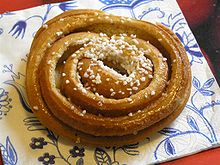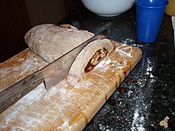Cinnamon roll
 Danish Kanelsnegl | |
| Alternative names | Cinnamon bun, cinnamon swirl, cinnamon snail |
|---|---|
| Type | Sweet roll |
| Place of origin | Sweden or Denmark |
| Main ingredients | flour, cinnamon, sugar, and butter |


A cinnamon roll (also cinnamon bun, cinnamon swirl, cinnamon Danish, and cinnamon snail[1][2]) is a sweet roll served commonly in Northern Europe and North America. In Denmark, it is the most common form of wienerbrød ('Vienna Bread') and is known as Kanelsnegl; 'cinnamon snail'. In North America, its common use is as breakfast or dessert. Its main ingredients are flour, cinnamon, sugar, and butter, which provide a robust and sweet flavor. In some places, it is eaten as a breakfast food and is served with cream cheese or icing.[3]
About
It consists of a rolled sheet of yeast-leavened dough onto which a cinnamon and sugar mixture (and raisins or other ingredients in some cases) is sprinkled over a thin coat of butter. The dough is then rolled, cut into individual portions, and baked or deep fried. In North America, cinnamon rolls are frequently topped with icing (usually confectioners' sugar-based) or a glaze. In Northern Europe, nib sugar is usually used with a glaze instead of icing. In North America, these rolls are also sometimes fried, glazed, and served as a variation of a raised donut.
The British version is an approximation of the Danish all-butter type and is readily available in cafes, supermarkets, and bakeries across the UK.
In Sweden, the country of its presumed origin, the cinnamon roll takes the name of kanelbulle (literally: 'cinnamon bun'). Since 2010, October 4 has been promoted as "kanelbullens dag" (Cinnamon Roll Day).[4][5] Swedish kanelbulle dough typically also contains cardamom (powder or buds), giving it a distinctive flavour. A German variety originating in Hamburg and its surroundings is the Franzbrötchen, a cinnamon pastry inspired by the non-cinnamon French croissant.
Cinnamon rolls are typically enjoyed during Fika which is a get together with friends. The average Swede eats approximately 316 cinnamon buns per year.[citation needed] The size of a cinnamon roll varies from place to place, but many vendors supply a smaller size about 5 centimeters (2.0 in) in diameter and a larger size about 10 cm (3.9 in) to a side. The larger variety can be found in Finland, called korvapuusti (literally: a 'slap on the ear'), where it can be up to 20 cm (7.9 in) in diameter and weigh up to 200 g (7.1 oz).[6] Haga, an area in Gothenburg, Sweden, is well known for their very large cinnamon rolls. These cinnamon rolls are called hagabullar or Queen of the kitchen. Hagabullar are usually 12 inches or more in diameter and are despite their size not considered a communal roll. Each person usually orders one each.[7]
The Finnish bostoninkakku ('Boston's cake') is a cake made by baking cinnamon rolls in a round cake pan instead of baking them separately, so that they stick together to form a large, round cake.[8]
- Cinnamon rolls
-
A Norwegian skillingsbolle
-
A 'loaf' of raw cinnamon roll dough being cut into individual rolls prior to being baked
-
A cinnamon roll with glaze
-
Cinnamon Rolls
-
Cinnamon Roll
See also
- Cinnabon - Bakery chain known for cinnamon rolls
- Chelsea bun - Confectionery made using a similar process
- Sweet roll
- Tahini roll
- Fig roll
- Tahinopita
- List of buns
References
- ^ The Free Dictionary. "cinnamon snail". Retrieved April 17, 2013.
- ^ Carlson, Jen. "Why The Cinnamon Snail Vegan Food Truck Is The Best Food Truck In Town". The Gothamist. Retrieved April 16, 2013.
- ^ "Screamin' Cinnamon Rolls With Cream Cheese Frosting". Food.com. Retrieved 20 July 2016.
- ^ "Kanelbullens Dag 4 Oktober". Kanelbullensdag.se. Retrieved 2010-06-04.
- ^ "Kanelbullar". Sweden.se. Retrieved 2013-03-25.
- ^ Korvapuusti in Finland Archived 2008-02-26 at the Wayback Machine
- ^ "Kanelbullar.se". Kanelbullar.se. Retrieved 2016-07-17.
- ^ "Boston cake". Saunalahti.fi. Retrieved 2012-11-18.




